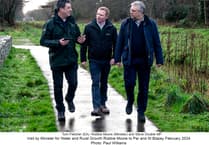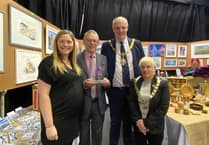To mark the coronation, all state-funded primary schools will be sent wildflower seeds, thanks to a collaboration between the Department for Education and the Eden Project that will empower children across the country to discover the joys of nature.
Two schools in Cornwall are among the first to participate in the biodiversity boosting initiative. Sowing took place on Lostwithiel Primary School and Mevagissey Community Primary School grounds on Tuesday (May 4).
More than 200,000 seed packets are being sent to schools in England, representing 40 hectares of new wildflower areas being planted up to boost biodiversity and support pollinators.
The initiative aims to improve children’s connection to nature and boost the biodiversity of the school estate, making them nicer places to work and learn, while supporting their mental and physical wellbeing.
To help young people celebrate the historical significance of the Coronation, the 32 nursery and Year 6 children at Lostwithiel Primary and 10 children from Mevagissey Community Primary School’s Eco Club were joined by the Eden Project’s National Wildflower Centre team to sow the native annual wildflower species.
Lostwithiel Primary School’s deputy head teacher Kate Webber said: “We were thrilled to take part in this initiative and sow wildflowers to celebrate the Coronation. It was a fantastic opportunity for our children to learn about the importance of improving biodiversity and to connect with nature. We can’t wait to see the wildflowers bloom and provide food for bees, butterflies and other pollinators in our school grounds.”
Dan James, development director for the Eden Project, said: “It is crucial that we replenish our biodiversity across the UK – and even small steps can make a difference. Through the work of the National Wildflower Centre, the Eden Project works with organisations across the UK to make new wildflower habitats that support wildlife and connect people to the natural world.
“This is a fantastic opportunity for the next generation to see the impact that wildflowers can have, even in small spaces. By encouraging our children to plant wildflower seeds we can work towards reversing the decline of pollinators that we are seeing across the UK which is so important for our future.”
The packets of seeds include native annual wildflower species such as cornflower, corn poppy, corn chamomile, corncockle, corn marigold and night-flowering catchfly. If sown this spring, they will be in bloom this summer.
Each seed packet covers around two square metres of blue, white, purple, red and yellow flowers that can be planted in pots, beds, or borders to boost colour and biodiversity in school grounds across England.
To support schools to celebrate the Coronation, the Department for Education has also commissioned a series of lesson plans and other teaching materials for primary and secondary schools to explain the significance of this historical moment. The charity Living Paintings has also designed, created, and published a pack of tactile and audio resources that will enable blind and partially sighted children to learn about the Coronation.
The Eden Project has also created free lesson resources for schools and families to learn how to make eco-decorations for their Coronation celebrations using natural objects found in their surrounding green spaces.
Guidance for teachers and schools on where and how to sow their wildflower seeds and other free lesson resources are available at www.edenproject.com




